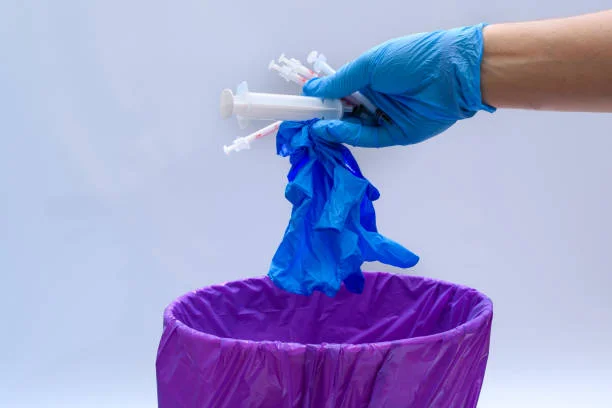Medical waste disposal is an often-overlooked issue with significant consequences for both human health and the environment. Improper handling of medical waste can have devastating effects on ecosystems, water sources, and air quality, as well as contribute to the spread of diseases. In this article, we’ll explore the environmental impact of improper disposal and provide practical strategies to mitigate these risks.
The medical waste disposal process is critical in ensuring that waste, such as sharps, pharmaceuticals, and infectious materials, is managed in a way that protects the environment. But when medical waste is discarded irresponsibly, it becomes a major environmental hazard. Whether it’s through landfills, incineration, or direct disposal into waterways, the effects of mismanagement can be long-lasting and severe.
What Is Medical Waste?
Medical waste refers to any waste generated during the diagnosis, treatment, or immunization of humans or animals. This includes items such as used needles, surgical instruments, bandages, gloves, and expired pharmaceuticals. The improper disposal of these materials can lead to contamination of natural resources and the spread of harmful pathogens. It’s essential to understand the different types of medical waste to know how to handle them properly. Some of these waste materials are hazardous, requiring specific disposal methods to prevent harm.
The Environmental Consequences of Improper Medical Waste Disposal
- Soil Contamination
One of the most alarming effects of improper medical waste disposal is the contamination of soil. When waste such as syringes, gauze, or expired medications is disposed of improperly, it can leach harmful chemicals into the earth. Over time, these chemicals may contaminate the soil, making it unsafe for plant growth and even entering the food chain through crops.
- Water Pollution
Improper disposal of medical waste into water bodies, whether through illegal dumping or landfill leachate, can have severe consequences on aquatic ecosystems. Toxic substances from medical waste can pollute rivers, lakes, and oceans, affecting aquatic life and ultimately entering the human food chain through contaminated fish and other marine life. Heavy metals and pharmaceutical residues in water can also pose significant health risks to those who consume or come into contact with polluted water sources.
- Air Pollution from Incineration
While incineration is sometimes used as a disposal method for medical waste, it poses a risk to air quality. The burning of certain types of medical waste releases harmful chemicals into the atmosphere, including dioxins and furans. These toxic compounds are linked to cancer, respiratory issues, and reproductive health problems. Furthermore, the incineration process can contribute to climate change by releasing carbon emissions.
- Spread of Infectious Diseases
Improper disposal of medical waste, particularly biological waste, can contribute to the spread of infectious diseases. For example, discarded needles and surgical tools can carry infectious agents like HIV, hepatitis, and other bloodborne pathogens. If not properly disposed of, these materials can pose a direct threat to public health, particularly in communities without proper waste management infrastructure.
Effective Strategies for Proper Medical Waste Disposal
To mitigate the environmental and public health risks associated with improper medical waste disposal, it is critical to implement safe and effective disposal strategies. Below are some key strategies for ensuring proper medical waste management.
- Segregation of Medical Waste
Proper segregation of medical waste at the point of generation is the first step in ensuring its safe disposal. By sorting waste into categories such as hazardous, non-hazardous, infectious, and recyclable, facilities can minimize the risk of contamination. This practice also makes it easier to handle and dispose of waste in the correct manner.
- Use of Certified Medical Waste Disposal Services
Partnering with certified medical waste disposal services ensures that waste is handled in accordance with local regulations and best practices. These services specialize in the safe transport, treatment, and disposal of medical waste. By outsourcing to a professional service, healthcare facilities can avoid the potential legal and environmental risks associated with improper disposal.
- Proper Treatment Methods
There are several methods for treating medical waste before disposal, each appropriate for different types of waste. Autoclaving, for example, uses steam and pressure to sterilize waste, while chemical treatment can neutralize hazardous materials. For more toxic or persistent waste, incineration may be necessary, but it should always be done in a controlled, regulated facility to minimize air pollution.
- Public Education and Awareness
Educating healthcare workers, waste management personnel, and the public about the risks associated with improper medical waste disposal is crucial. Awareness campaigns can help encourage proper waste segregation, discourage illegal dumping, and promote safe handling practices. In addition, educating communities on the importance of safe disposal practices can help reduce accidental exposure to harmful waste.
- Sustainable Alternatives
One approach to reducing the impact of medical waste is exploring sustainable alternatives. For instance, hospitals can opt for single-use, biodegradable products where possible, reducing the volume of non-degradable waste. Additionally, switching to environmentally friendly packaging and reducing the use of toxic chemicals in medical products can lower the amount of hazardous waste generated.
Role of Regulations in Ensuring Proper Disposal
Government regulations play an essential role in managing medical waste disposal. Many countries have strict guidelines and laws governing the handling, transport, and disposal of medical waste to protect both public health and the environment. These regulations require healthcare facilities to implement specific waste management practices and undergo regular inspections to ensure compliance.
In the United States, for example, the Environmental Protection Agency (EPA) and the Occupational Safety and Health Administration (OSHA) regulate medical waste management. Similarly, in the European Union, the Waste Framework Directive sets out stringent rules for the disposal and recycling of waste materials. Adhering to these regulations ensures that medical waste is disposed of in a safe, environmentally responsible manner.
Why Safe Medical Waste Disposal Matters
The importance of proper medical waste disposal cannot be overstated. Not only does it protect public health and the environment, but it also helps healthcare facilities comply with legal requirements and reduce their overall environmental footprint. Sustainable practices in medical waste disposal can significantly reduce pollution, prevent the spread of disease, and promote healthier communities.
By adopting safe waste management practices, healthcare facilities, and individuals can ensure that medical waste is disposed of responsibly. The long-term benefits of these practices will be felt not only in improved public health but also in a cleaner, safer environment for future generations.
Final Thoughts on the Environmental Impact of Medical Waste Disposal
Proper medical waste disposal is essential to preventing environmental contamination and safeguarding public health. As we’ve discussed, improper disposal can lead to soil and water pollution, air contamination, and the spread of infectious diseases. However, with proper waste segregation, adherence to regulations, and the adoption of sustainable practices, these risks can be significantly reduced.
In the ongoing efforts to mitigate the environmental impact of medical waste, collaboration between healthcare facilities, waste management services, and the public is key. Through awareness, education, and responsible waste handling, we can collectively work towards a safer and more sustainable future.
Explore smarter ways to grow, learn, and achieve your goals at Management Works Media.






